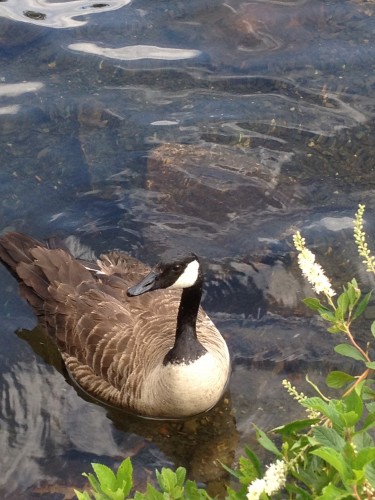





Q: Is there a way to control Canadian geese that won’t leave our pond?
A: Extension agent Jule-Lynne Macie says Mike Mengak, UGA Extension Wildlife Specialist, always reminds people that, “A Canadian is a human being from the country of Canada. All geese are Canada Geese; one of them is a Canada Goose”.
The Canada goose is a migratory bird species that is afforded the protections of the Migratory Bird Treaty Act, Federal regulations, and State laws. Handling and lethal management of Canada geese for damage management purposes, such as capturing and euthanizing birds, or shooting birds outside of established hunting seasons, require depredation permit(s), but there are a couple of options.
Obviously, don’t feed the birds if you have been. The easiest and cheapest option is to allow the grass to grow tall (20 to 30 inches in a strip 20-30 feet from the pond bank). This will deter geese from foraging. They also avoid these areas because they cannot see predators that might be hiding in the tall grass. Unfortunately, most people want a smooth lawn down to the pond or lake. It’s much better from a water quality standpoint to have a riparian buffer such as tall grass or shrubbery. This helps ‘catch’ pollutants such as fertilizer, pesticides and even trash, from getting into your water.
There are geese taste repellents. The active ingredient in MIGRATE (Bird-B-Gone) is methyl anthranilate. It can be an effective repellent. However, it is water soluble and washes off with rain and irrigation. There is another similar product called “Goose Chase”. These products can be rather expensive.
USDA Wildlife Services will capture and relocate geese. There are two types of trapping that they do. The first is called Goose Round Up and takes place during wing molt (late June-early July). When the birds are molting they can’t fly and are easier to catch. They are relocated at least 100 miles away – usually somewhere in south Georgia. Only 2-3% return to the same site. Their wings are clipped when they relocate them so they can’t fly until the next year. Hopefully by then they are happy where they are. Contact the Athens office (below) in late April to schedule your Goose Round Up. The second trapping and relocation method can be done any time of year and involves drugging the geese. Each goose must eat a piece of drugged bread for this to work. The goose goes to sleep for about 8 hours and when it wakes up it has a new home! This method works best for small numbers of geese that are used to getting fed by people. Both of these methods are on a fee basis since it is not funded by the state.
Contact the USDA Wildlife office in Athens (706-546-5637) if you want to look into trapping. They can discuss the fees USDA charges for this activity. After trapping, you may need to deal with new geese populations so try harassment.
Harassment includes chasing the geese and yelling, running a dog after them (especially a dog that likes water – Border Collies and Labs have been used to harass geese). Be careful with your animals though – geese can be aggressive. Harassment works best in new populations. It needs to be immediate and relentless. Once a day isn’t enough. Geese that have settled in may just look at you or honk back.
You can also try some habitat modification. Geese typically like to walk right up the bank out of the water, so making the bank steep might help. Also, fencing along the edge can deter them for the same reason. But, they can fly so they might decide to just fly over the fence if they really want into the yard.
The Georgia Department of Natural Resources can give permits for lethal Canada Goose control certain times of the year – May- August. Proof of non-lethal controls are usually required before a permit will be issued. You would also have to follow local gun ordinance statutes.
One other option is getting a nuisance goose trapping permit from DNR. You would then hire a trapper to trap and relocate the geese. I will warn you that this is more costly than the USDA trapping program. For trappers, remember that this is their livelihood. You may get a quicker response from professional trappers for the same reason. USDA is only trying to recoup costs and they usually have a backlog. For information about the Georgia DNR permits call 770-918-6416.
Doug Hall is a retired wildlife biologist who specializes in nuisance bird control.
Halls Wildlife Assistance
[email protected], 706-817-3575

Copyright © www.100flowers.win Botanic Garden All Rights Reserved